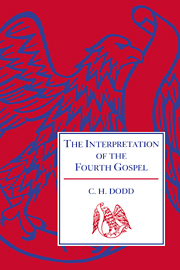Book contents
- Frontmatter
- Contents
- PART I THE BACKGROUND
- PART II LEADING IDEAS
- 1 Symbolism
- 2 Eternal life
- 3 Knowledge of God
- 4 Truth
- 5 Faith
- 6 Union with God
- 7 Light, Glory, Judgment
- 8 Spirit
- 9 Messiah
- 10 Son of Man
- 11 Son of God
- 12 Logos
- PART III ARGUMENT AND STRUCTURE
- APPENDIX: Some considerations upon the historical aspect of the Fourth Gospel
- Index Locorum
- Index Nominum
2 - Eternal life
from PART II - LEADING IDEAS
Published online by Cambridge University Press: 10 December 2009
- Frontmatter
- Contents
- PART I THE BACKGROUND
- PART II LEADING IDEAS
- 1 Symbolism
- 2 Eternal life
- 3 Knowledge of God
- 4 Truth
- 5 Faith
- 6 Union with God
- 7 Light, Glory, Judgment
- 8 Spirit
- 9 Messiah
- 10 Son of Man
- 11 Son of God
- 12 Logos
- PART III ARGUMENT AND STRUCTURE
- APPENDIX: Some considerations upon the historical aspect of the Fourth Gospel
- Index Locorum
- Index Nominum
Summary
We may find a natural starting point in the evangelist's own statement of the purpose of his book: he writes, iννα πιστεōντε ωήν χητε(xx. 31). This is indeed the purpose for which Christ came into the world: γώ λōν να ωήν γωσιν(X.10). ‘Life’ therefore is a major theme of the book. What then does the evangelist mean by ‘life’?
In just short of half of the occurrences of the word ω it has the epithet ανήō, without any apparent difference of meaning. The terms ωή and ωή ανō, belong to the common vocabulary of early Christianity, but except in the Fourth Gospel and I John the simple ωή is preferred, the form ωή αώνιō, being absent from Hebrews, the epistles of James, Peter, and Jude, and Revelation. Both the simple and the compound term have Jewish precedent. ‘Life’ in the Old Testament, where there is generally no idea of immortality, means ‘earthly life and well-being’. The term ω ανō, occurs only in the Greek versions of Dan. xii. 2 (= DViS7 n), i.e. in the one Old Testament book which teaches quite unequivocally the doctrine of a future life.
The word D*?iy, with αν as its equivalent, denotes properly a period of time of which the beginning or the end or both are out of sight, an indefinitely long rather than strictly an infinite period. ωή αώνιō, might therefore mean this earthly life indefinitely prolonged. In Enoch x. 10 it is even used for long life, where an ultimate termination is nevertheless contemplated.
- Type
- Chapter
- Information
- The Interpretation of the Fourth Gospel , pp. 144 - 150Publisher: Cambridge University PressPrint publication year: 1953
- 4
- Cited by



